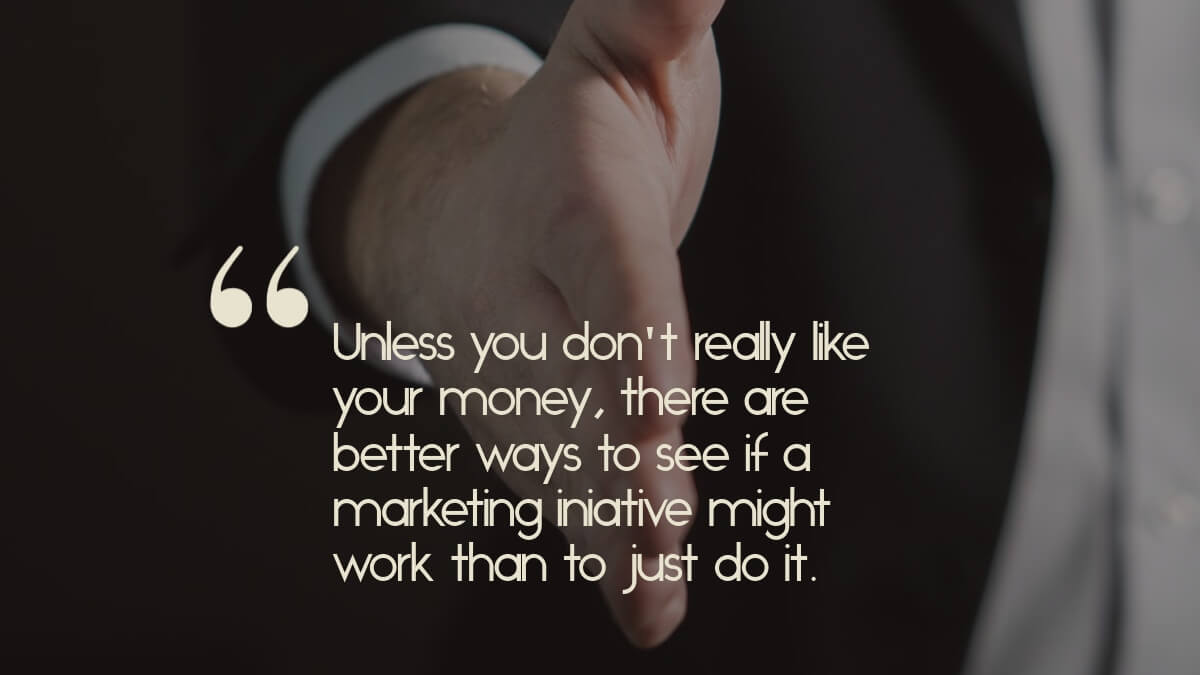How do you know if that great marketing idea will work for your business?

We’ve all had it happen: a salesperson walks in your door (or your inbox) and tells you all about this great small business marketing thing that will attract more customers. You want more customers, you think to yourself. Should you try it? Will it work?
Well, there are two ways to find out. One way is to go ahead and purchase their thing or ad space or what-have-you and see what happens.
Now, let me be clear; I do NOT recommend this method. Not only is it a good way to waste money on speculation, but it actually isn’t a very good test, unless it comes with great built-in analytics.
The other way is to do some basic marketing vetting.
First, does this marketing thing reach your ideal customer at all? (remember your ideal customer?) If the marketing thing is a smartphone app and your best customers are over 70, run away (OK, Theron tells me this is a bad example, since there’s a lot of 70+ers who are super smartphone savvy… but you get my drift).
Second, does it allow you to tell your story in a compelling way? Your logo on a pen doesn’t give much idea about what sets you apart from the competition. A little social video gives you a great platform.
Third, follow a very basic marketing formula. Look at how many of your ideal customers are likely to see your marketing thing for the money you spend on it. Us marketers call that your cost per impression, or CPI*, but really it’s just about being as efficient as possible with your marketing spend.
One thing to remember when you look at how much it costs for each ideal customer to see your marketing thing is the simple fact that you need many, many ideal customers to see that marketing thing before even one walks in your door/visits your website… and how many people walking in your door does it take before you make a sale?
Yeah. Marketing is about scale. You need a lot of people to see your marketing thing before you see results. And you want to make darn sure the cost of getting that result isn’t more than the result you get; in other words, as a rule of thumb your cost to acquire a customer shouldn’t be more than you get from an average sale.
That said, there are some cases where it may make sense to spend more to acquire a customer than you get the first time they purchase from you. If, for instance, you’re a chiropractor or hairdresser, and you know that the vast majority of people who walk in the door will become regular customers with a nice long revenue stream. Or, say you’re a house painter, and you know each customer tends to refer multiple new jobs. Or you’re just getting started, and need to get the word out about your business.
If all this sounds complicated, let me simplify by listing a few things that often don’t pay off:
- logo merchandise: most of this usually ends up going to employees or current customers. There’s good reasons to give stuff to both those groups, but don’t expect it to get you new customers
- b2b trade conferences: booths at trade conferences often are very expensive, and pull in very few leads. The one exception is if you can get a speaker’s role at the conference. That’s a game changer
- print advertising: I hate to say it, but a lot of print advertising has seen its day. Unless your ideal customer is of a generation that tends to read the paper/magazine/pennysaver more than surf the web, be very careful about your print purchases, especially on a small budget
- one-off sponsorships: thinking about being a silver sponsor for some charity auction? Absolutely follow your heart if you want to give a donation, but don’t expect a single sponsorship to pull in new customers. The only way sponsorship campaigns really pay off is if you have the budget to do A LOT.
Happy small business marketing,
Katie & Theron
*you may also see CPM (cost per mille, meaning thousand), and CPC (cost per click). CPM tends to be an older marketing metric from the good ol print and TV days. If someone is giving you the cost in CPM, just divide by 1000 to get your cost per impression. Cost per click, on the other hand, is very common today. This means you pay when someone clicks on your digital ad. CPC numbers will be smaller than your cost for impression and will have much better conversion rates.
At Urban Sherpa Marketing Co. we offer marketing advisory, strategic planning, and services for small business and startups, including content marketing. Our goal is to make high-quality marketing possible for every business, no matter the size. Think of us as your outsourced marketing department, strategic marketing adviser, or even your phone-a-friend marketing lifeline. We specialize in building efficient marketing programs to grow your business without blowing the bank.
Share this on:

